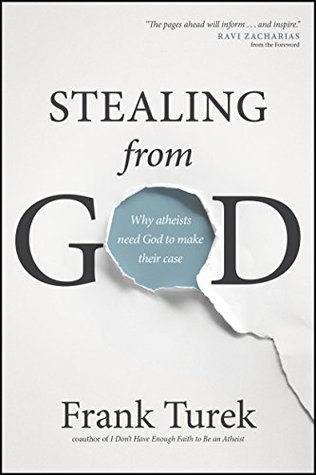More on this book
Kindle Notes & Highlights
by
Frank Turek
Read between
July 20 - July 30, 2017
To put it simply, when you assert that there is such a thing as evil, you must assume there is such a thing as good. When you say there is such a thing as good, you must assume there is a moral law by which to distinguish between good and evil.
An atheistic reality has no such standard, which Dawkins has acknowledged. He wrote, “it is pretty hard to defend absolutist morals on grounds other than religious ones.”[4]
forerunner of the new atheists, Crick used research in neuroscience to advocate atheistic materialism in his book, The Astonishing Hypothesis. He wrote, “The Astonishing Hypothesis is that ‘You,’ your joys and your sorrows, your memories and your ambitions, your sense of personal identity and free will, are in fact no more than the behavior of a vast assembly of nerve cells and their associated molecules.”[6]
Third, if atheists merely “lacked a belief in God,” they wouldn’t be constantly trying to explain the world by offering supposed alternatives to God.
If Christianity were true, would you become a Christian? I’ve asked that question to several atheists at college campus events and received some pretty shocking responses
The most common logical mistake we’ll see is that atheists violate the law of noncontradiction. They put forth a theory about reality that is supposed to be universal, but then they exempt themselves from it.
If space, time, and matter had a beginning, then the cause must transcend space, time, and matter. In other words, the cause must be spaceless, timeless, and immaterial. This cause also must be enormously powerful to create the universe out of nothing. And it must be a personal agent in order to choose to create, since an impersonal force has no capacity to choose to create anything. Agents create. Impersonal forces, which we call natural laws, merely govern what is already created, provided agents don’t interfere.
Since nature had a beginning, nature can’t be its own cause. The cause must be beyond nature,
I said, “John, we will never find a natural cause for all of nature.” “We will!” he insisted. “No, John, we can’t in principle. If nature had a beginning, then the cause can’t be something natural because nature didn’t exist. Nature was the effect, so it can’t be the cause. The cause must be something beyond nature, or supernatural.”
Let’s look at option two first. Option two says that someone created something out of nothing. Now, that is a miracle. But at least there is a miracle worker—“someone.” Option one is a miracle with no miracle worker. That’s clearly absurd.
C. S. Lewis famously wrote, “Good philosophy must exist, if for no other reason, because bad philosophy needs to be answered.”[13]
Dr. Paul Davies, who is an agnostic on the question of God, is a respected cosmologist at the University of Arizona. Yet many of his scientific colleagues were practically accusing him of scientific blasphemy after Dr. Davies asked questions like those in his New York Times opinion piece titled “Taking Science on Faith.”[16] Davies wrote, “All science proceeds on the assumption that nature is ordered in a rational and intelligible way. You couldn’t be a scientist if you thought the universe was a meaningless jumble of odds and ends haphazardly juxtaposed.” Davies observed that scientists take
...more
Davies thinks it’s “anti-rational” and makes “a mockery of science” to say that this ordered and rational universe exists as a brute fact “reasonlessly.” He wrote, “Can the mighty edifice of physical order we perceive in the world about us ultimately be rooted in reasonless absurdity? If so, then nature is a fiendishly clever bit of trickery: meaninglessness and absurdity somehow masquerading as ingenious order and rationality.” Exactly. How is it that a highly ordered and rational universe came from complete disorder and irrationality? Both atheists and theists have to answer that question.
The scientific method can’t discover metaphysical principles anyway. All it can do is use them.
I think Michael actually was on to something. He was correct to surmise that the laws of logic are grounded in a mind, but just not the temporal, changeable human mind he was advocating. Since the laws of logic are timeless, spaceless, immaterial, and unchangeable, they seem to be grounded in a timeless, spaceless, immaterial, and unchangeable Mind. Laws only come from lawgivers. That’s what all experience shows us. Why think the laws of nature and the laws of logic are exceptions?


